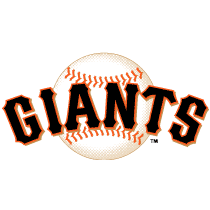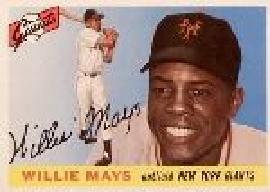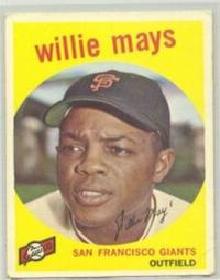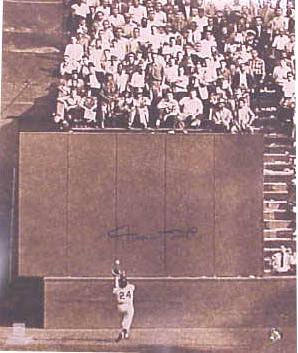






 |  |  |  |  |  |  |
 |
 |
|
Mays was a tremendous athlete, and every facet of the game seemed to come naturally to him. He could hit for both average and power, finishing his career with a batting average of .302, 660 home runs and 1902 runs batted in. He is among the few players to have hit more than 50 home runs in each of two or more seasons. He is the player with the longest time elapsed between 50+ homer seasons, hitting 50 or more in both 1955 and 1965. Unlike some of the game's greatest hitters, Mays was also an outstanding defensive player. After their introduction in 1957, he won 12 consecutive Gold Glove Awards for his outfield defense and gained a reputation for making catches that no other player could. He was also an excellent baserunner, swiping 339 bags in his career, making him one of the few members of the 300-300 club. He was also the second member of the 30-30 club for stealing 30 bases and hitting 30 home runs in the same season, a feat he accomplished twice. In addition, Mays was said to lead an abstemious lifestyle, neither drinking nor smoking, which probably contributed to his great longevity as a player. In 21 seasons (excluding one lost partially to military service), he played 150 or more games 15 times and more than 100 an additional five times.
Mays' athleticism was evident from an early age. At high school he played quarterback on the football team, and was offered college scholarships in both football and basketball. Rejecting both, he began to play professionally as soon as he left school, playing briefly with the Chattanooga Choo-choos before returning to his home town to join the Birmingham Black Barons of the Negro American League in 1947. Wisely, he eschewed signing a contract with the Barons. He was scouted by a number of major league teams, but in 1950 the New York Giants signed him, and sent him to their Class-B affiliate Trenton, New York. After hitting .353 in Trenton, he began 1951 playing for the AAA Minneapolis Millers of the minor league American Association. With the Millers, Mays was immediately a fan favorite with his stellar offense and defensive play. Hitting .477 after 35 games, he was called up to the major leagues in May, 1951, after Giants owner Horace Stoneham took out a full page advertisement in several Minneapolis newspapers, apologising for taking him away from the Millers.
With the Giants, Mays immediately entered a slump, starting his career by getting no hits in his first 13 at bats. Worried, he asked manager Leo Durocher to send him back to the Millers. Durocher, who would be one of Mays's greatest admirers and defenders throughout his career, refused, telling Mays he was the Giants center fielder as long as Durocher was manager. The next day, Mays got his major league first hit, a home run off Warren Spahn of the Boston Braves.
From then on, his hitting steadily improved, although his .274 average, 68 RBI and 20 homers (in 121 games) would be among the worst of his career. Nevertheless, he won the 1951 Rookie of the Year Award, and ended the regular season as a somewhat nervous on-deck batter when Bobby Thomson's famous three run homer won the pennant for the Giants. Mays performed poorly in the 1951 World Series, as the Giants were beaten 4-2 by the New York Yankees, but the series marked the only time that Mays and the aging Joe DiMaggio would play on the same field. Playing a bit part for the Yankees was DiMaggio's heir apparent, and the player most comparable to Mays over their long careers, the 19 year old Mickey Mantle.
Mays served in the U.S. Army during the Korean War, but did not see action overseas. He missed part of the 1952 season and all of the 1953 season, as the Giants finished 2nd and 5th in the National League. He returned in 1954, hit .354 with 41 home runs, and helped carry the Giants to a 97-57 record, the National League pennant and a four-game sweep of the Cleveland Indians in the World Series. In Game 1 of the series Mays made one of the greatest defensive plays of all time, a brilliant over-the-shoulder catch of a long drive by Vic Wertz, deep in centre field of the spacious Polo Grounds. The play, now known simply as "The Catch", which kept the scores tied. After the Giants' victory, Mays was announced as winner of the National League Most Valuable Player Award and the Hickok Belt as top professional athlete of the year.

Nevertheless, under Dark, the Giants made the World Series in 1962, defeating the Los Angeles Dodgers in a three game play off series. In the first game Mays hit two home runs. In the deciding third game, as in 1951, the Giants again scored four times in the ninth inning, to take the win and the series. Over the season, Mays was clearly the star. Playing in 162 games, he hit .304, and led the Giants in runs scored (130), RBI (141), doubles, triples, homers (with 49), stolen bases, on base percentage and slugging percentage as his play down the stretch enabled the Giants to catch the Dodgers. In the Series, the Giants again lost to the Yankees, this time in seven games. Mays hit .286, with only one extra base hit. It was his last Series appearance as a Giant. As he aged, Mays continued to play brilliantly. In the '63 and '64 seasons he again scored and drove in over 100 runs, and hit a total of 85 homers, but the Giants finished 2nd and 3rd in the league, even with the young Willie McCovey playing almost as well as Willie in 1963.
Mays won his second of two MVP awards in 1965, hitting a career high 52 long balls. One of those home runs, hit on September 13, off Don Nottebart, was the 500th of his career. Warren Spahn, who had given up the very first, was then with San Francisco and greeted Mays as he returned to the dugout. "Was it anything like the same feeling?" asked Spahn. "It was exactly the same feeling," Mays replied. "Same pitch, too."
Willie also put himself at the center of the year's greatest controversy, acting as a peacemaker during Giant pitcher Juan Marichal's notorious attack on John Roseboro and helping the bleeding Dodger catcher from the field, an act that gained him considerable respect from the Los Angeles fans. He continued to play with that franchise until partway through the 1972 season, when he joined the New York Mets. The primary motivation for Mays' trade to the Mets was financial. The Giants were losing money and owner Horace Stoneham could not guarantee him an income after retirement, where the Mets offered him the option to be hired as a coach after his playing days were over. This was quite important to Mays as he had made some unwise investments and was not as wealthy as commonly believed. He played with the Mets until his retirement after the 1973 season. The Mets made the World Series in Mays' final year, only to lose in seven games to the A's.
Mays is the only MLB player to have a 4-home run game and a 3-triple game in a career.
Mays was a coach for the New York Mets and also acted in a PR role for the club until 1979. He also served as a guest host of the Dick Cavett Show. In 1979, he was elected to the Hall of Fame in his first year of eligibility, appearing on 95% of the ballots cast. Shortly after, he took a job as a greeter in a casino in Atlantic City. Commissioner Bowie Kuhn immediately suspended Mays from involvement in organised baseball. Despite public outcry, the suspension would not be lifted till 1985 by Kuhn's successor, Peter Ueberroth. Having returned to Atherton, Mays is presently employed as Special Assistant to the Giants and appears often at baseball memorabilia shows.
Mays' number 24 is retired by the San Francisco Giants. Their home ballpark, SBC Park, is located at 24 Willie Mays Plaza with a larger-than-life statue of Mays in front of the main entrance and the right-field wall is 24-feet high, all in honor of Mays. Mays is the godfather of baseball star Barry Bonds. They share a close bond, and when Bonds tied Mays at third on the all time home run list, Mays greeted him warmly and presented him with a diamond-studded Olympic torch given to Mays for his part in carrying the Olympic Torch on its tour through the US.

 |  |  |  |  |  |  |